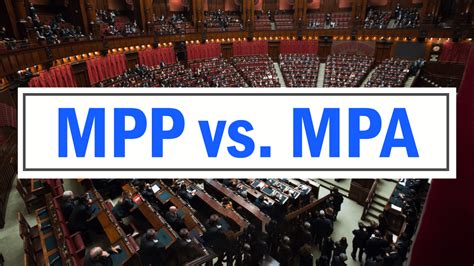Introduction

In the realm of law enforcement, the choice between a Master of Public Policy (MPP) or a Master of Public Administration (MPA) can significantly shape a police officer’s career trajectory and effectiveness. Both degrees offer distinct advantages and cater to different professional goals and aspirations.
MPP vs MPA: A Comparison
Master of Public Policy (MPP)
- Focuses on policy analysis, development, and implementation
- Prepares students for careers in public policy research, advocacy, and consulting
- Curriculum includes coursework in economics, statistics, policy analysis, and governance
- Graduates typically work in government agencies, think tanks, non-profit organizations, and international institutions
- Median annual salary: $120,000
Master of Public Administration (MPA)
- Focuses on public sector management and administration
- Prepares students for careers in government administration, nonprofit management, and healthcare administration
- Curriculum includes coursework in public budgeting, human resources, organizational theory, and leadership
- Graduates typically work in local, state, or federal government agencies, non-profit organizations, and university administration
- Median annual salary: $90,000
MPP for Police Officers
Benefits of an MPP:
- Enhanced policy analysis skills: MPP graduates are equipped with analytical tools and methods to identify policy problems, develop evidence-based solutions, and evaluate the effectiveness of public programs. These skills are essential for police officers seeking to influence policy decisions that impact their work and communities.
- Broader perspective on public affairs: MPP programs provide a comprehensive understanding of public policy, governance, and economics. This knowledge empowers police officers to make informed decisions and engage effectively with stakeholders, including lawmakers, community leaders, and the public.
- Networking opportunities: MPP programs offer opportunities to connect with professionals in the public policy field. These connections can be invaluable for police officers seeking mentors, career advancement, and influence over policymaking.
Considerations for Police Officers:
- Time commitment: MPP programs typically require 18-24 months of full-time study or 2-4 years of part-time study.
- Cost: MPP programs can be expensive, with tuition and fees ranging from $30,000 to $100,000.
- Job market: The MPP job market is competitive, especially for candidates without prior policy experience. Police officers with an MPP may need to supplement their law enforcement background with additional qualifications to enhance their competitiveness.
MPA for Police Officers
Benefits of an MPA:
- Specialized management skills: MPA programs provide practical training and knowledge in public sector management, including budgeting, human resources, organizational theory, and leadership. These skills are essential for police officers who aspire to leadership roles or administrative positions within law enforcement agencies.
- Focus on public service: MPA programs emphasize the importance of public service and ethical conduct. This aligns well with the values and mission of police officers, who are committed to serving and protecting their communities.
- Career advancement opportunities: An MPA can provide a pathway to promotional opportunities within police departments, as well as to management positions in related fields such as public safety administration and homeland security.
Considerations for Police Officers:
- Less emphasis on policy analysis: MPA programs focus more on management and administration than on policy analysis. Police officers seeking to influence policy may find an MPP a more appropriate choice.
- May not be necessary for all: An MPA may not be necessary for all police officers, especially those who are not seeking leadership or administrative roles.
- Cost: MPA programs can be expensive, with tuition and fees ranging from $30,000 to $100,000.
Which Degree is Right for Me?
The choice between an MPP and an MPA depends on the individual police officer’s career goals, interests, and qualifications. Here are some questions to consider:
- What are your long-term career aspirations? Do you seek to influence policymaking, lead a police department, or manage public safety programs?
- Do you have a strong interest in policy analysis and research?
- Do you need specialized management skills to advance your career?
- What is your current educational background and experience?
Conclusion
Both the MPP and the MPA can provide valuable educational opportunities for police officers. An MPP is ideal for those seeking to influence policymaking and engage in policy research, while an MPA is a better fit for those seeking management and leadership roles within law enforcement agencies. By carefully considering their career goals and aspirations, police officers can make an informed decision about the degree that best serves their professional development and career advancement.
Tables
Table 1: Degree Comparison
| Degree | Focus | Median Annual Salary |
|---|---|---|
| MPP | Policy Analysis and Development | $120,000 |
| MPA | Public Sector Management and Administration | $90,000 |
Table 2: MPP Benefits for Police Officers
| Benefit | Description |
|---|---|
| Enhanced Policy Analysis Skills | Analyze policy problems, develop solutions, and evaluate effectiveness |
| Broader Perspective on Public Affairs | Understand public policy, governance, and economics |
| Networking Opportunities | Connect with public policy professionals |
Table 3: MPA Benefits for Police Officers
| Benefit | Description |
|---|---|
| Specialized Management Skills | Develop skills in budgeting, human resources, and leadership |
| Focus on Public Service | Emphasize ethical conduct and service to the community |
| Career Advancement Opportunities | Enhance qualifications for leadership and management roles |
Table 4: Considerations for Choosing a Degree
| Factor | Questions to Ask |
|---|---|
| Career Goals | What are my long-term career aspirations? |
| Interests | Am I interested in policy analysis, research, or management? |
| Qualifications | Do I have a strong academic background in the relevant areas? |
